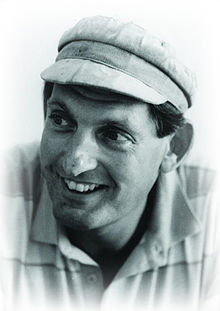- David Fanshawe
-
David Arthur Fanshawe (19 April 1942, Devon – 5 July 2010) was an English composer, ethnomusicologist and self-styled explorer.[1] His work is situated at the crossroads of traditional and modern music. His best-known composition is the 1972 choral work African Sanctus.
Contents
Life
Fanshawe was born in Paignton in Devon in 1942. His father was a successful officer in the Royal Artillery who played a central role in the planning of D-Day. His stories of military service in India fired his son's enthusiasm for travel and adventure. David Fanshawe's first ambition was to be an explorer but when he attended St George's School, Windsor Castle and Stowe School he discovered a love of music. However, his severe dyslexia prevented him from reading a musical score and becoming a chorister.[1]
At Stowe School he spent much of his spare time learning to play the piano, and when he was 17 he was discovered by the mother of a schoolfriend, a French baroness, who tutored him in the piano even after he left the school in 1959. He started his adult career as a musician and film editor for a small production company in Wimbledon in London who made documentary films. In 1965 Fanshawe won a scholarship to the Royal College of Music, where he studied composition under John Lambert. During his holidays he continued to travel widely in Europe and the Middle East. During a summer spent hitchhiking in Afghanistan he heard Islamic music for the first time and was immediately attracted to its beauty. During further travels in Iraq and Bahrain he recorded the traditional music he heard.[1]
On completing his studies in 1969 Fanshawe travelled up the Nile from the Mediterranean Sea, visiting Egypt, Sudan, Uganda and Kenya over a three year period before finally reaching Lake Victoria. Taking with him a small stereo tape recorder, he would persuade local musicians to play for him.[1] Returning to the United Kingdom in 1972 with several hundreds of hours of recordings made during his travels, Fanshawe used the material to compose what became his best known work, African Sanctus. After this work he became widely known for the composition of choral works. Besides vocal pieces, he also composed the score for more than 50 films and TV productions, including the BBC's When the Boat Comes In and Softly Softly - Task Force and ITV's Flambards and Rank's Tarka the Otter. His ethnic field recordings have featured in countless TV documentaries, including Musical Mariner and Tropical Beat. They have also been used in various feature films including Mountains of the Moon, How to Make an American Quilt, Gangs of New York and Seven Years in Tibet.[2][3]
During a ten-year odyssey across the islands of the Pacific Ocean begun in 1978, he collected several thousand hours of indigenous music, and documented the music and oral traditions of Polynesia, Micronesia and Melanesia in journals and photographs. These form the core of the Fanshawe Collection, an archive of 2,000 hours of world music and 60,000 images. In 2007 a movement based on this material, Pacific Song, was given its premiere at Miami. This was the first completed section of Pacific Odyssey, a new choral work which Fanshawe conceived on an even more epic scale than African Sanctus, but it was not completed by the time of his death.[1]
Fanshawe was awarded the honorary degree of Doctor of Music by the University of the West of England in 2007 in recognition of his outstanding contribution to bringing music from around the world into the lives of people who neither read nor write music and to his pursuit of musical excellence.[4] He was the recipient of a Churchill Fellowship and received a nomination for an Ivor Novello Award for the recording of African Sanctus.[1]
David Fanshawe married Judith Croasdell Grant in 1971; they had two children together, Alexander and Rebecca. The marriage was dissolved in 1985. He married his second wife Jane in 1985, with whom he had a daughter, Rachel. His younger brother is James, an ex-naval officer.
He lived near Ramsbury in Wiltshire in England, and died on 5 July 2010 from a stroke.[5]
Works (selection)
- African Sanctus, a work for soprano alto tenor and bass choir, soloists, percussion and tapes
- from which The Lord's Prayer is also performed separately
- When the Boat Comes In - television score
- Flambards - television score
- The Feathered Serpent - television score
- Dona Nobis Pacem - A Hymn for World Peace
- Dover Castle
- Requiem for the Children of Aberfan
- The Awakening for cello or viola and piano
- Planet Earth - Fanfare and March
- Serenata
- Pacific Song - Chants from the Kingdom of Tonga
References
External links
Categories:- 1942 births
- 2010 deaths
- Old Stoics
- People from Paignton
- English composers
- Light music composers
- Alumni of the Royal College of Music
- Ethnomusicologists
- English musicologists
- Deaths from stroke
- African Sanctus, a work for soprano alto tenor and bass choir, soloists, percussion and tapes
Wikimedia Foundation. 2010.

